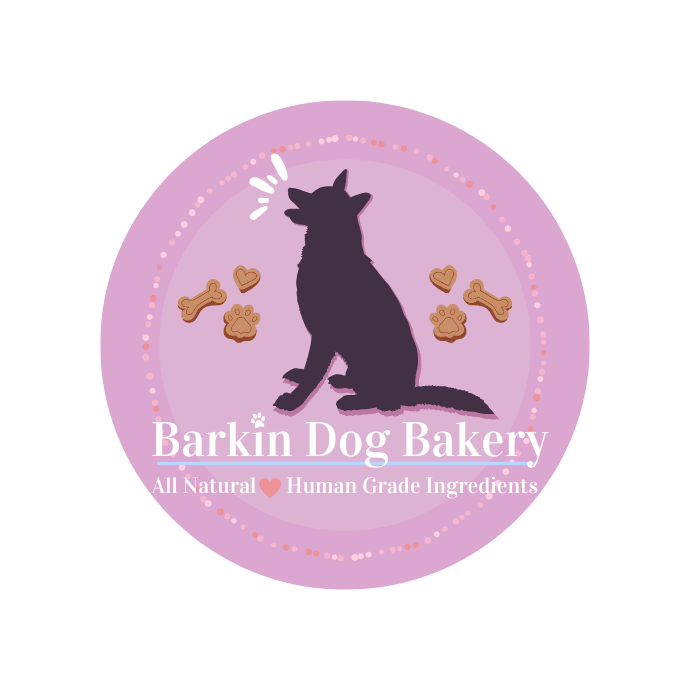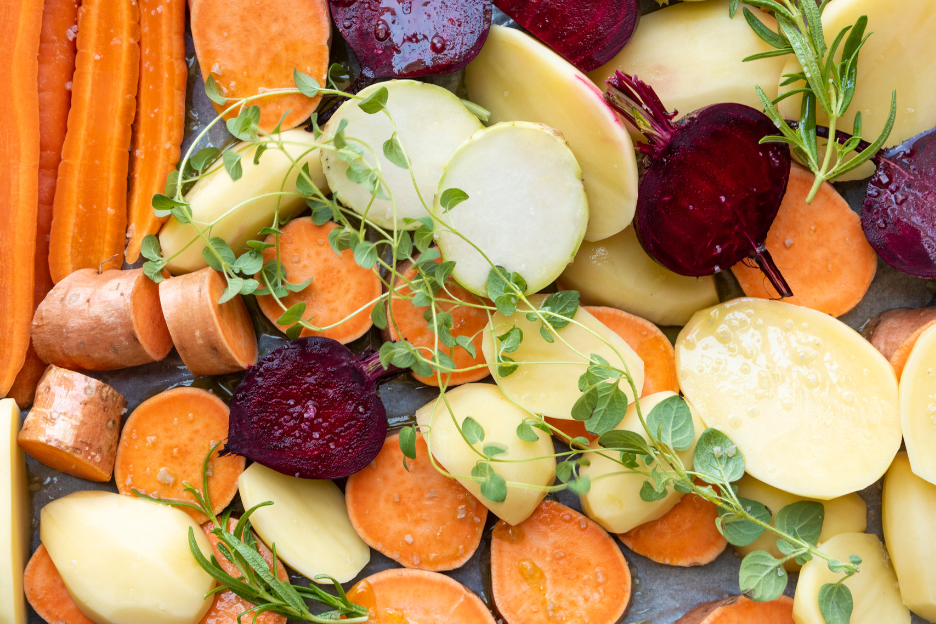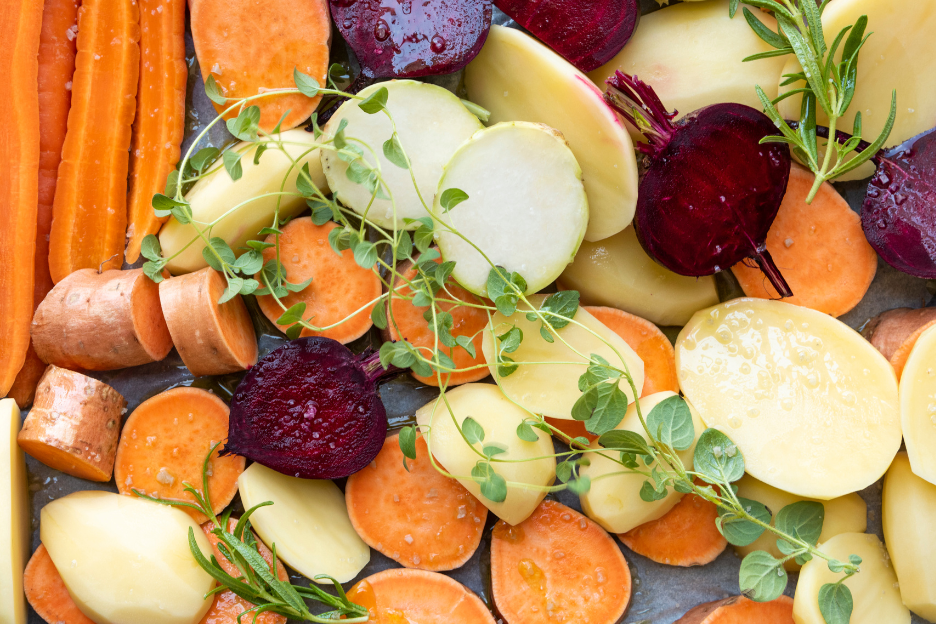Barkin Dog Bakery's non-comprehensive list of all-natural, human-grade ingredients used in our products.

Our main ingredient is Chickpea Flour. Chickpea Flour also known as Garbanzo Bean Flour offers many benefits for dogs of all ages. It is a great substitute for dogs with food sensitivities because it is both gluten and grain-free. Plus, the fiber found in chickpeas can help keep your dog regular. It's also a great source of protein, potassium, magnesium, and folate as well as vitamins A, B, and C. Additionally, "chickpeas contain choline, which reduces chronic inflammation, assists in nerve impulse transmission, maintains cell membrane structure, and aids in fat absorption, all of which help keep an arthritic pet comfortable" (Trupanion, 2023).

Our other ingredients include:
Pumpkin is a superfood for dogs which contains essential micronutrients, vitamin A (beta-carotene), and fiber that makes it very nutritious. Besides being a natural stomach soother, pumpkin also helps to remove excess water in a dog's digestive tract. It also contains a lot of potassium, which helps regulate blood pressure, improves muscle health, and assists in metabolism. Some smaller amounts of nutrients include vitamin C, iron, phosphorus, magnesium, and folate.
Carrots are rich in vitamin A (beta-carotene) which is good for supporting your dog's eye health, immune system, skin, and coat. Other vitamins include B, C, D, E, and K. Carrots are also high in fiber and contain other valuable nutrients like calcium, phosphorus, potassium, magnesium, lycopene and lutein. Both lycopene and lutein protect your dog’s eyes from free radical damage and UVB radiation.
Spinach contains large amounts of vitamins A, B, C, and K. It also contains iron, antioxidants, beta-carotene, and roughage, which stimulate the digestive tract. "Spinach also contains beneficial nutrients and antioxidants that your dog needs. In the proper amounts, this low-calorie, leafy green vegetable can improve your dog’s overall health. Spinach boosts the immune system, increases energy levels, and prevents some types of cancer" (Guthrie, 2022).
Broccoli is filled with a variety of important vitamins and nutrients, including vitamin C, vitamin K, and potassium. These nutrients are good for heart health, bone density, and the immune system of our dogs. Broccoli is also low in calories and high in fiber to keep your dog’s digestive system moving.

Peas, in moderation, are packed with minerals like iron, zinc, potassium, and magnesium. They're also rich in protein and high in fiber. Peas contain lutein, an anti-oxidant good for skin, heart, and eye health. Peas are also low in calories and aid in hydration due to their water content.
Sweet Potatoes are "one of the best dietary sources of vitamin A, which promotes healthy skin, coat, eyes, nerves, and muscles in dogs. Sweet potatoes are a rich source of vitamins C, B6, potassium, calcium, and iron, just to name a few" (Saylor, 2023). They are also a good source of dietary fiber, which helps dogs with digestion. These special spuds are considered to be a complex-carbohydrate, meaning they provide a steady source of energy for dogs. "As a source of carbohydrates, sweet potatoes have a relatively low glycemic index as well, which means they’re less likely to cause a spike in your dog’s blood sugar, a benefit for dogs with diabetes" (Saylor, 2023).
Cilantro contains "a great source of calcium, as well as magnesium, which can help your dog's structural bone health. Cilantro contains vitamin K, which supports skin and fur health" (Lowrey, 2022). Equally, the vitamin A in cilantro is beneficial to your dog's eye health. Cilantro has vitamin C that supports the immune system. "Cilantro also has antifungal and antibacterial properties which can aid your dog’s digestive system. It’s also useful for freshening your dog’s breath" (MasterClass, 2022).
Beets are "loaded with fiber, vitamins, and minerals, including vitamin C, potassium, folate, and magnesium. The skin contains betalain pigments, which have antioxidants and anti-inflammatory properties" (Reisen, 2022).
Curly Parsley, given sparingly, can be one of the best natural sources of vitamin K for your dog. Vitamin K helps maintain a healthy blood clotting system and promotes liver health. "Parsley is also rich in folic acids and antioxidants" (Redbarn Team, 2016).

Raspberries are "low in sugar and calories but high in fiber, manganese, and vitamin C. In particular, raspberries are an excellent source of: dietary fiber, which helps improve a dog's digestive system and fights obesity" (AKC Staff, 2022). Therefore, raspberries keep your dog fuller for a longer period of time. "They are also very rich in antioxidants. Raspberries (alongside blackberries and blueberries) have one of the highest levels of antioxidants of all commonly consumed fruits" (Taylor, 2022).
Bananas have a "high fiber content and can help your dog feel better if they have gastrointestinal problems. Also, the magnesium in bananas can promote bone growth and help your dog produce proteins and better absorb vitamins" (Weishaupt, 2021). "Bananas are a good sources of potassium, vitamin B6, vitamin C, fiber, magnesium, and manganese. They are also low in sodium and cholesterol" (Weishaupt, 2021). Bananas are a healthy, low-calorie alternative to salty, fatty treats.
Blackberries have the "fatty acid Omega-3 which helps keep your dog's coat shiny and can help reduce inflammation. Anthocyanins ... are antioxidants, which improve brain function, reduce inflammation, and can reduce the risk of some cancers" (Reisen, 2022). Likewise, "vitamins—A, B, C, E, and K—boost immunity and metabolism; support skin, bone, and tooth health; promote muscle development; and are good for your dog’s brain, heart, and coat" (Reisen, 2022).
Strawberries are "packed with antioxidants, low in calories, high in dietary fiber, and a good source of vitamin C. Strawberries also contain folate, manganese, potassium, magnesium, and fiber" (Guthrie, 2023). Additionally, strawberries have malic acid, an enzyme that helps aid in whitening your pup’s teeth (Guthrie, 2023).
Blueberries are "known for their disease-fighting properties, called phytochemicals, that battle things like cancer and heart disease. They also provide antioxidants and vitamin C" (Arnold, 2022). "Blueberries are also low in calories and high in fiber. They help prevent cell damage, can improve night vision, and can even help promote mental function in senior pets" (Arnold, 2022). Blueberries also contain vitamins A, K, and the nutrients potassium, magnesium, phosphorus, and calcium (Arnold, 2022).
Pitaya is rich in vitamin C, "which can help strengthen your dog’s immune system and improve cognitive function. Pitaya has fatty acids omega-3 and omega-9 that can help keep your dog’s coat shiny and strong. It also has Beta-carotene which helps to strengthen your dog’s eyes" (MasterClass, 2022).
Coconut contains "anti-inflammatory properties that speed healing and reduce swelling around cuts, wounds, and hot spots. Coconut has lauric acid, which fights viruses, yeast infections, ringworm, and Giardia" (Rouge Pet Science, 2023). "Coconut also has lots of antioxidants that help defend the body against bacteria, parasites, fungi, and can relieve dry, itchy skin. The fatty acids in coconut also help support a healthy coat" (Rouge Pet Science,2023).
Apples provide "an excellent source of vitamin C, which is necessary for proper immune function. They’re also loaded with carbohydrates, the ultimate energy source, and are high in fiber, which plays a role in digestion and blood sugar regulation" (Joy, 2022). Apples also contain vitamin A, potassium, and antioxidants.



